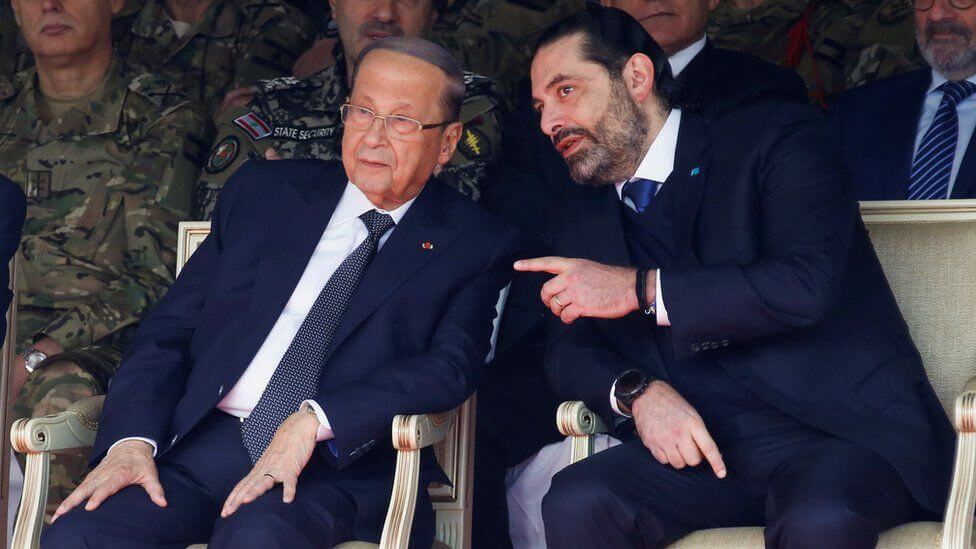Lebanese Prime Minister (PM) designate Saad Hariri resigned on Thursday over “key differences” with President Michel Aoun regarding forming a new government. Hariri’s resignation threatens to worsen the months-long political deadlock that has plunged the Mediterranean country into economic collapse.
The PM-designate decided to step down following the submission of a new cabinet proposal to Aoun on Wednesday. Hariri said he disagreed with the President on the cabinet formation process since his stance on the issue remains unchanged. “I asked President Aoun if he needs more time to discuss the line-up, but he answered that it seems that we won’t agree, that’s why I submitted to him my resignation and may God help the country,” he said. “There is [a] camp that has decided to torture the country and take us to hell, and this camp created all the obstacles that I faced,” Hariri added, referring to Aoun and his allies. Moreover, Hariri noted that while he will not be naming a successor, he had no intention to “obstruct [or] paralyse” future political negotiations.
Hariri and Aoun have been blaming each other for preventing the formation of a new government. Hariri accused the pro-Hezbollah Aoun of allying with the militant group to obtain one-third of the cabinet seats based on sectarian and partisan lines. One-third of seats would give the alliance veto power over government decisions and policies. “The main problem of this country is Michel Aoun, who is allied with Hezbollah, who in turn protects him. This is the equation in the country, and if someone can’t see it, then they’re blind,” Hariri warned.
Following Hariri’s announcement, protesters blocked roads and set fire to tires in parts of Beirut while protesting against the country’s deteriorating state of affairs. Security forces were deployed in areas where protests broke out and used armoured vehicles to open roads and fired in the air, warning protesters to leave.
Also Read: Qatar to Provide Lebanese Soldiers With Aid Amid Worsening Economic Crisis
Meanwhile, the United States (US) Secretary of State, Antony Blinken, called Hariri’s resignation “yet another disappointing development for the Lebanese people.” Blinken said the formation of a government “able to implement priority reforms” was crucial and urged authorities to start preparing for the 2022 parliamentary elections. “Lebanon’s political class has squandered the last nine months. The Lebanese economy is in free-fall, and the current government is not reliably providing basic services. Leaders in Beirut must urgently put aside partisan differences and form a government that serves the Lebanese people,” Blinken stated.
The United Nations (UN) and France also reacted sharply to the latest developments in Beirut. A UN spokesperson called the incident regrettable and urged leaders to immediately prioritise the formation of a government capable of addressing the country’s crisis. Likewise, French Foreign Minister Jean-Yves Le Drian accused Lebanese officials of “cynical self-destruction” and blamed them for leading the country into economic collapse.
Following last year’s devastating blast at the Beirut Port, which resulted in more than 200 deaths and about $15 billion in economic losses, the government led by then-PM Hasan Diab stepped down, and Diab assumed the role of caretaker PM. At the same time, Hariri was appointed as PM-designate in October to form a new government. However, due to tensions between ethnically divided political parties, the country has been unable to create a new cabinet ever since. Hariri’s resignation reduces the chances of forming a new cabinet any time soon.
The World Bank has stated that the country’s economic crisis ranks as one of the worst that the world has witnessed in over 150 years. It reported that “Lebanon is enduring a severe and prolonged economic depression, which is among the most severe crisis episodes globally since the mid-nineteenth century.” Lebanon is also facing severe food, medicine, and fuel shortages. The GDP growth rate has crashed by around 40%, unemployment levels have skyrocketed, and inflation has soared. The World Bank believes that the crisis can only be resolved by a “reform-minded government which embarks on a credible path toward economic and financial recovery.”

